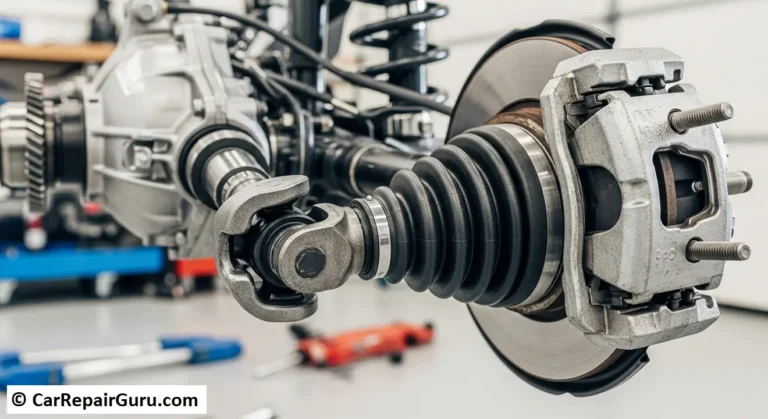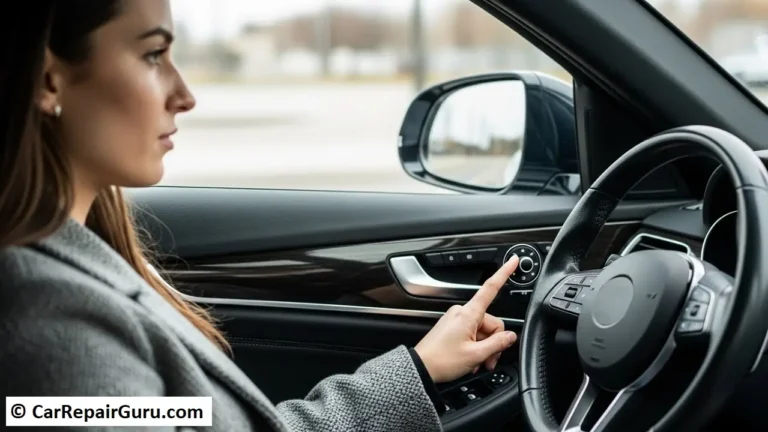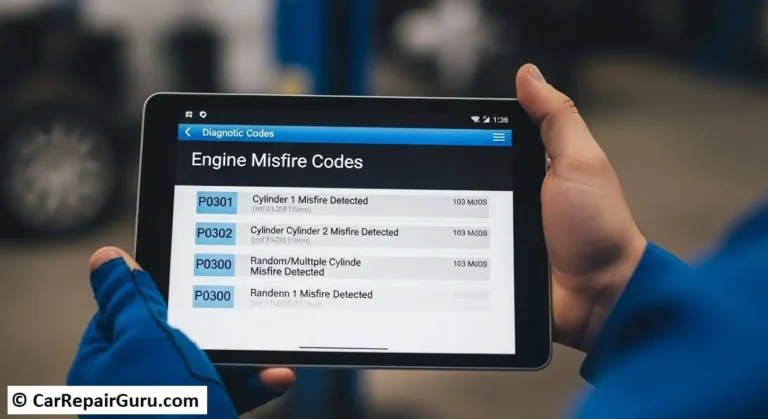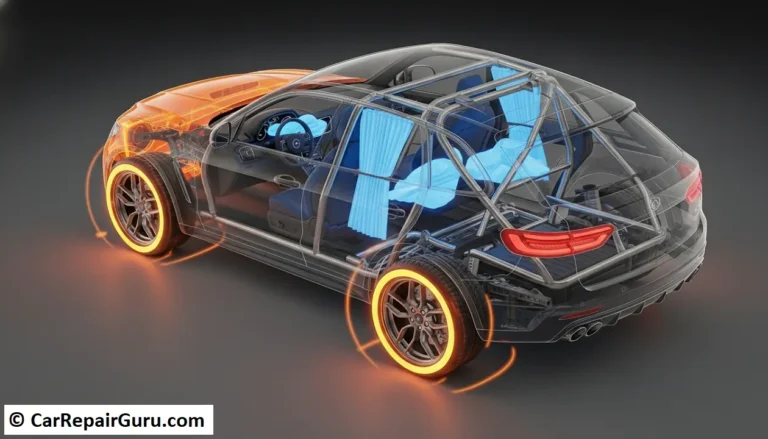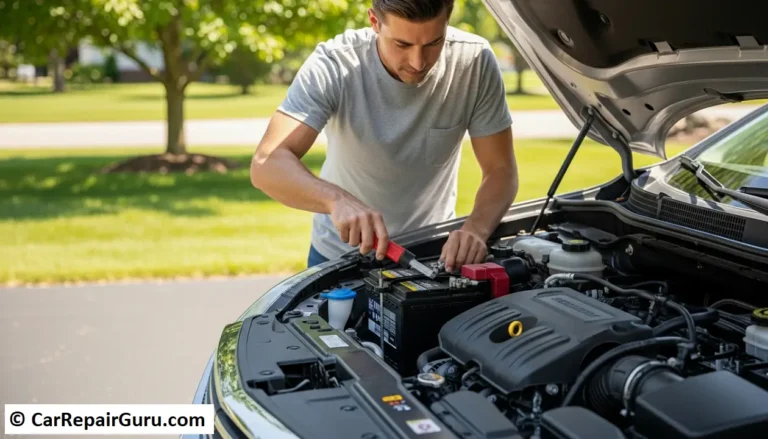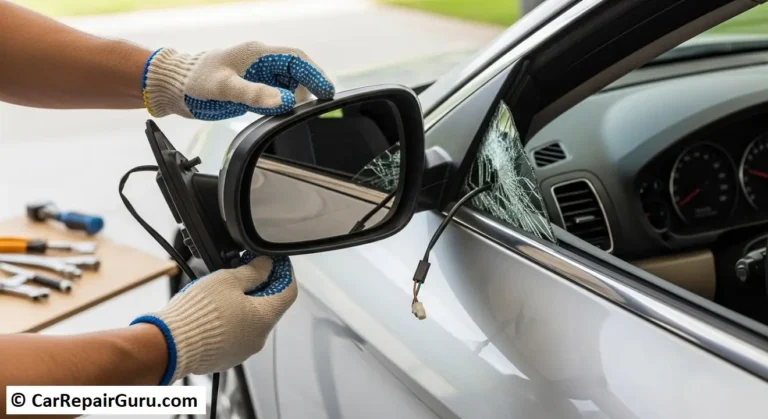
Introduction
We all want our cars to last longer and run smoothly, right? While major accidents can spell disaster for your vehicle, it’s often the small, seemingly insignificant car care mistakes that lead to costly repairs and a shorter lifespan for your trusty ride.
Think of it as automotive Darwinism – survival of the fittest – except you have the power to extend your car’s lifespan with proper maintenance. So, before you shrug off that tiny oil leak or consider running your tank on fumes “just one more time,” keep reading to learn about 10 common bad car habits and how to avoid them.
Avoid These Costly Car Habits to Keep Your Ride Running Smoothly
1. Ignoring the Oil Light: Stop Risking Engine Failure
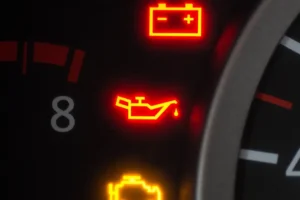
We’ve all been there – a warning light flickers on, and we think, “It’s probably fine.” But while some warning lights can be ignored temporarily, the red oil light is not one of them. This light indicates low oil pressure, which can lead to catastrophic engine damage if ignored.
What to do: If your oil light illuminates while driving, pull over immediately and turn off the engine. Check your oil level and add oil if needed. If the light persists, do not attempt to drive further. Call a tow truck and get your car to a mechanic ASAP.
Think of it this way: Would you rather pay for an oil change or a new engine?
2. Driving on Fumes: Protect Your Fuel Pump with These Tips
We get it; life is busy, and sometimes filling up the tank slips your mind. But consistently driving on low fuel is like playing Russian roulette with your car’s fuel system. When your fuel level is extremely low, debris and contaminants that settle at the bottom of the tank can be sucked into the fuel pump and lines, potentially causing clogs and damage.
What to do: Make it a habit to refuel when your tank reaches a quarter full. This not only protects your fuel system but also prevents you from being stranded with an empty tank.
Quick Tip: Regularly refuel at a quarter tank to save on repairs and avoid breakdowns.
3. Car Covers: protection or Breeding Ground for Rust?
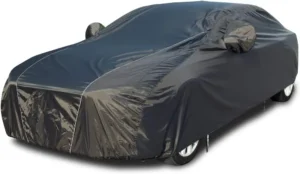
A car cover can be a great investment for protecting your car’s paint from the elements, but like many things in life, moderation is key. Constant use of a car cover, especially in humid climates, can trap moisture underneath, creating a breeding ground for rust and mold.
What to do: Use a car cover strategically, such as during prolonged periods of storage or when parking outdoors in harsh weather conditions. Ensure the cover is breathable and allow your car to air out regularly.
Quick Tip: Think of it as giving your car a chance to breathe!
4. Ignoring Rust: Don’t Let It Eat Your Car.
Rust is like a cancer for your car . if left untreated, it will spread and eventually cause significant damage. Even a small rust spot can quickly grow and weaken the metal, compromising your car’s structural integrity and safety.
What to do: Address rust spots as soon as you notice them. This may involve sanding down the affected area, applying rust converter, and repainting.
Pro Tip: Early intervention saves on costly rust repairs later.
5. The Wrong Fuel: A Costly Mistake for Your Engine

This mistake can be an expensive one, and unfortunately, it happens more often than you might think. Putting the wrong fuel in your car can lead to serious engine damage and require costly repairs, including a complete fuel system flush.
What to do: If you realize you’ve put the wrong fuel in your car, do not start the engine. Call a tow truck and have your car transported to a mechanic.
Quick Tip: Always double-check at the pump or consult your owner’s manual to ensure the correct fuel.
6. Skipping Car Maintenance: A Recipe for Major Repairs
Skipping scheduled maintenance is like neglecting your own health – it might seem fine in the short term, but it will catch up with you eventually. Regular maintenance is crucial for keeping your car running smoothly and preventing major problems down the road.
What to do: Consult your owner’s manual for the recommended maintenance schedule for your specific make and model. This typically includes oil changes, fluid flushes, filter replacements, brake inspections, and more.
Pro Tip: Regular maintenance might seem like an added expense, but it’s far cheaper than dealing with major repairs caused by neglect.
7. Ignoring Car Fluid Leaks: Don’t Ignore the Drip

A small drip might not seem like a big deal, but ignoring car fluid leaks can lead to major problems. Not only can leaks indicate serious mechanical issues, but they can also lead to costly damage if left unaddressed.
What to do: Regularly inspect your parking spot for signs of leaks. If you notice any fluids dripping from your car, identify the type of fluid and consult a mechanic to diagnose and repair the source of the leak.
Engine Oil: Dark brown or black
Coolant: Green, yellow, or orange
Transmission Fluid: Reddish and oily
Brake Fluid: Clear to yellow, slippery
Quick Tip: Place cardboard under your car overnight to spot leaks and identify fluid type.
8. Manual Transmission? Stop Riding the Clutch Pedal
This one’s for the manual transmission drivers out there. Resting your foot on the clutch pedal, even slightly, can lead to premature wear and tear on the clutch. This seemingly harmless habit can result in costly clutch replacements down the road.
What to do: Keep your foot off the clutch pedal unless you’re actively shifting gears. Make it a conscious effort to break this habit and extend the life of your clutch.
Think of it this way: Treat your clutch like a light switch – engage it only when necessary.
9. Storing Your Car? Prevent Damage With These Tips
Cars are meant to be driven, and leaving them idle for extended periods can lead to a host of problems. Batteries can drain, tires can develop flat spots, fluids can deteriorate, and engines can suffer from lack of lubrication.
What to do: If you must store your car for an extended period, take steps to prepare it properly. Disconnect the battery, inflate the tires to the proper pressure, and consider using a fuel stabilizer.
Even better: If possible, have a friend or family member drive your car occasionally to keep everything running smoothly.
10. Overloading Your Vehicle: Know Your Limits

Every car has its limits, and exceeding your vehicle’s towing or payload capacity can put significant strain on the engine, transmission, brakes, and suspension components.
What to do: Consult your owner’s manual for your car’s specific towing and payload capacities. Never exceed these limits, even for short distances.
Remember: Safety first! Overloading your vehicle can also affect its handling and braking performance, putting you and other drivers at risk.
Quick Recap: Top Tips for Better Car Care
- Monitor Warning Lights: Take oil and check-engine lights seriously.
- Maintain Fuel Levels: Keep at least a quarter tank to prevent debris issues.
- Prevent Rust and Leaks: Act fast on rust spots and fluid drips.
- Stick to Maintenance Schedules: Follow the manual for long-term savings.
- Respect Limits: Avoid overloading to protect performance and safety.
FAQs About Car Habits
Q: How often should I check my tire pressure?
A: It’s recommended to check your tire pressure at least once a month. Proper tire pressure ensures optimal fuel efficiency, handling, and tire longevity.
Q: What does it mean if my check engine light is flashing?
A: A flashing check engine light typically indicates a serious engine problem that requires immediate attention. It’s crucial to have your car diagnosed by a mechanic as soon as possible.
Q: How do I know if my car battery needs to be replaced?
A: Signs of a failing car battery include slow engine cranking, dim headlights, and a clicking sound when you turn the key. If you experience any of these symptoms, have your battery tested by a mechanic.
Q: How can I tell if my car’s fluids are leaking?
A: Look for fresh stains under your car. Dark brown or black indicates engine oil, while green, yellow, or orange usually points to coolant leaks. This can help diagnose potential issues early.
Conclusion: Cultivating Good Car Habits:
Taking care of your car doesn’t require extensive mechanical knowledge or a garage full of tools. By being mindful of these common car care mistakes and adopting simple preventative measures, you can extend the life of your vehicle, save money on costly repairs, and enjoy many miles of safe and reliable driving.
Key Points and Tips
- Be proactive: Don’t wait for problems to arise before addressing them. Regular inspections and maintenance are key.
- Consult your owner’s manual: Your owner’s manual is a treasure trove of information about your specific car’s needs and maintenance schedule.
- Don’t be afraid to ask for help: If you’re unsure about something, consult a trusted mechanic.
Final Thoughts:
Your car is a significant investment. Treat it with care, and it will reward you with years of reliable service. Schedule that maintenance appointment, address those minor issues before they escalate, and enjoy peace of mind knowing you’re doing everything you can to keep your car running smoothly.
